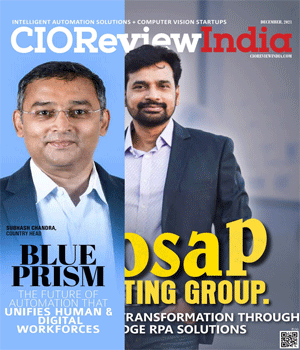
Multiplying Opportunities In Big Data Analytics
Diwakar Chittora, Founder & CEO, Intellipaat
 The advent of modern computer networks and the democratization of information has exponentially multiplied the amount of digital data being generated. According to a Cisco estimate, global IP Traffic will reach two zetta bytes by 2019. (1 zettabyte = 1 billion terabytes). This unprecedented increase in data has come about not only due to employment of existing methods, but from new horizons that have seen massive growth in the number of connected devices. Portable devices are at the center of data growth. Also, additional volumes from M2M (Machine to Machine) data through AI and IoT technologies are responsible for constant data accumulation. The term Big Data has come into daily parlance owing to a shift in analyzing structured relational databases toward working with massive quantities of unstructured databases generated through a variety of sources. There developed an urgent need to build tools that analyze and interpret such unstructured datasets.
The advent of modern computer networks and the democratization of information has exponentially multiplied the amount of digital data being generated. According to a Cisco estimate, global IP Traffic will reach two zetta bytes by 2019. (1 zettabyte = 1 billion terabytes). This unprecedented increase in data has come about not only due to employment of existing methods, but from new horizons that have seen massive growth in the number of connected devices. Portable devices are at the center of data growth. Also, additional volumes from M2M (Machine to Machine) data through AI and IoT technologies are responsible for constant data accumulation. The term Big Data has come into daily parlance owing to a shift in analyzing structured relational databases toward working with massive quantities of unstructured databases generated through a variety of sources. There developed an urgent need to build tools that analyze and interpret such unstructured datasets.
Rapid Emergence of Massive Data on the internet
Always connected portable devices have expanded the opportunities for inputs to the internet massively. Data today is being referred to as the life blood of digital organizations and the currency of the new digital economy, suggesting a level of significance and value distinctly higher than in previous times. While the price of computing continues to fall, data driven business models are becoming attractively affordable. Research firm, Markets and Markets, tells us that Enterprise Data Management, including software and services for migrating warehousing, integrating and analyzing all forms of data will approach $105 billion by 2020.
Skill shortage to Handle Big Data
However, one of the major challenges to handling Big Data is a paucity of skills required in the workforce. Usage in industry is moving away from SQL(Sequential Query Language) to manage structured relational database sets to management and analysis of unstructured data. In order to handle Big Data, we need to anticipate the three phases of data analytics, viz. collection & storage, processing & organizing and analysis & visualization.
What does a Big Data Analyst do?
Since data analytics and management are relatively older areas in the tech world as compared to Artificial Intelligence, Cloud systems and the Internet of Things, employers are somewhat aware of the skills that would be required. Nevertheless, the requirements of today and the future will depend more on the analytics part. The most important question that we can then ask is How can we intelligently use huge volumes of data for business transformation covering incremental revenue, trimming costs, enhanced & informed decision making, and target marketing. Therefore, much of the skill gaps around data handling now rest on Real Time Analytics, Predictive modeling, data security, distributed storage and data mining.
Current Industry Skillset Requirements for Big Data Analytics
Based on current industry trends and nature of business needs, Big Data professionals tought to have the following competencies:
·Data Interpretation and Visualization encompasses job functions such as Data Analytics and Business Intelligence. In this domain, the competency requirement will emphasize upgrading the instruments of data analytics and warehousing; for example, Netezza, MicroStrategy, SAS and Tableau.
·Data Processing and Management encompasses job functions like database administration, creation, data integration and data lifecycle management. Workers in this profession must work on database software and platforms like Microsoft Oracle Cloudera and Hadoop.
·Data Infrastructure is the platform upon which data management lies and job functions covering data storage, data center management, business continuity and data security are emerging. In order to gain entry into this interesting and much in demand field, one would need to go through a comprehensive program designed and delivered by leading experts in the field such as Intellipaat, Cloudera or Horton works. Different roles require different focus competencies and one must choose accordingly.
CIO Viewpoint
Upcoming Technological Advancements in Payments...
By Pinak Chakraborty, CIO of Airtel Payments Bank
Shaping the Future of AI: Talent, Innovation,...
By Yann LeCun, Chief AI Scientist at Meta
Future of Smart Manufacturing: Integrating Tech...
By Mohammed Kaishulla, Chief information officer, EPACK Durable
CXO Insights
3 Focus Areas For An Autonomous Driving Revolution
By Varun Chhabra, Vice President, Product Marketing Cloud, Dell Technologies
Multiplying Opportunities In Big Data Analytics
By Diwakar Chittora, Founder & CEO, Intellipaat
Impact Of Cloud Computing In Logistics Management










